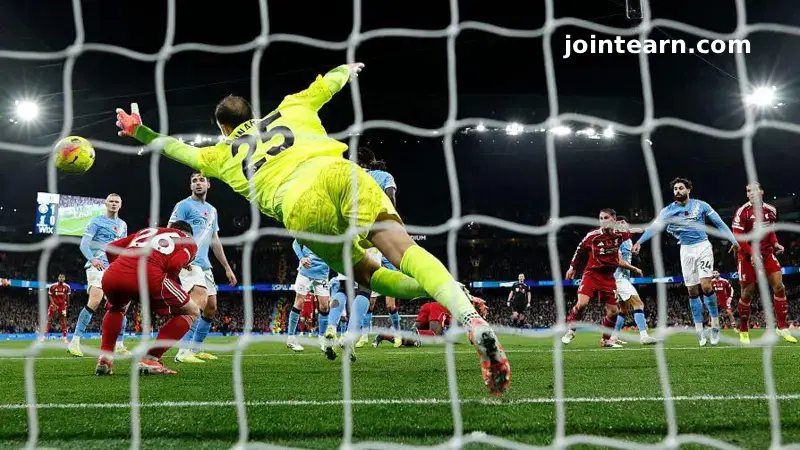
Liverpool’s controversial disallowed goal against Manchester City has sparked widespread debate, with the Premier League’s Key Match Incidents (KMI) panel confirming that VAR acted correctly not to overturn the decision – despite a split among the experts on the on-field ruling.
The incident occurred in the 38th minute at Etihad Stadium, when Liverpool captain Virgil van Dijk thought he had equalized. However, referee Chris Kavanagh, assisted by Stuart Burt, ruled the goal out for offside, citing that Andrew Robertson had ducked under the ball in a way that could have interfered with City goalkeeper Gianluigi Donnarumma.
Liverpool went on to lose 3-0, but the disallowed goal has continued to dominate post-match analysis, highlighting ongoing questions about VAR in Premier League football.
How the VAR and KMI Panel Decisions Worked
The Premier League’s KMI panel, which reviews key refereeing decisions weekly, is made up of three former players, alongside one representative each from the Premier League and Professional Game Match Officials (PGMO).
On this particular incident:
- Three of five panel members felt the on-field offside decision was incorrect.
- However, the same 3-2 vote concluded that VAR was correct not to intervene, demonstrating the subjective nature of offside calls and goalkeeper interference.
According to the panel, Robertson’s position and movement did not clearly impact Donnarumma’s attempt to save the header, meaning the goal could have been allowed. Yet one panel member argued that the movement in front of the goalkeeper was not a clear and obvious error, justifying VAR’s decision not to overturn the call.
Howard Webb, the referees’ chief, described the ruling as “not unreasonable,” acknowledging the inherent challenges in split-second decisions during top-level football.
The Role of VAR and Offside Interpretation
VAR is designed to intervene only when there is a clear and obvious error in the referee’s on-field decision. In this case, while the KMI panel felt that the goal should likely have been awarded, the margin for interpretation meant that VAR correctly stayed out of the call.
The panel explained:
“The on-field call is a straight vote, but potential VAR intervention is weighted toward a clear and obvious error. It is possible for the panel to disagree with the on-field decision yet still consider VAR’s choice correct, as occurred here.”
This ruling underscores one of the ongoing debates in Premier League refereeing: the subjectivity of goalkeeper interference and offside interpretation, even with modern technology.
Other VAR Decisions Reviewed
The KMI panel also highlighted other key decisions from the same weekend:
- Brentford vs Newcastle: Dango Ouattara was denied a penalty after a challenge from Dan Burn. The panel unanimously agreed Burn had committed a foul and the penalty should have been awarded, but the VAR outcome remained split, with a 2-3 vote deeming it a clear error.
- Arsenal vs Sunderland: Referee Craig Pawson correctly ruled no penalty after Dan Ballard caught Mikel Merino with an elbow. The panel unanimously supported the on-field decision, emphasizing that contact occurred during a normal footballing action.
These examples highlight that while VAR can assist referees, split opinions among experts and officials continue to fuel debate about its effectiveness and consistency.
Liverpool Fans and Analysts React
The disallowed goal reignited discussions on social media and among football pundits. Many argued that Robertson’s action did not materially impact the play, while others maintained that VAR’s intervention rules were correctly applied.
Football analyst Dale Johnson noted:
“This incident shows that even with technology, offside decisions are highly subjective. Fans may see a clear error, but the laws of the game require VAR to only correct decisions that are indisputably wrong.”
Liverpool manager and players have not formally appealed, but the conversation over VAR’s role and interpretation will continue to dominate Premier League discourse.
Key Takeaways
- Liverpool’s disallowed goal at Manchester City remains one of the most debated VAR incidents of the 2025 Premier League season.
- The KMI panel split 3-2 on the on-field offside call but agreed VAR correctly did not intervene.
- Offside interpretation, especially regarding goalkeeper interference, remains subjective even with video review.
- Other weekend VAR reviews demonstrate the consistency and limitations of technology in football officiating.
- Fans and analysts continue to debate VAR’s impact, emphasizing the tension between technology and human judgement in modern football.


Leave a Reply